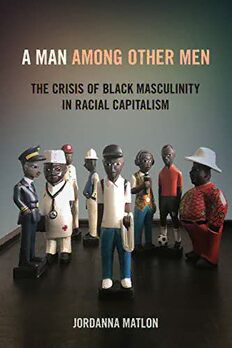
A Man among Other Men: The Crisis of Black Masculinity in Racial Capitalism PDF
Preview A Man among Other Men: The Crisis of Black Masculinity in Racial Capitalism
A MAN AMONG OTHER MEN A MAN AMONG OTHER MEN The Crisis of Black Masculinity in Racial Capitalism Jordanna Matlon CORNELL UNIVERSITY PRESS I THACA AND LONDON Some of these chapters have appeared in previous forms in: Antipode; American Sociological Review; Boston Review; CODESRIA Bulletin; Contexts; Ethnography; Global Dialogue; Laboratorium; Poetics; and Wiley Blackwell Encyclopedia. Copyright © 2022 by Cornell University All rights reserved. Except for brief quotations in a review, this book, or parts thereof, must not be reproduced in any form without permission in writing from the publisher. For information, address Cornell University Press, Sage House, 512 East State Street, Ithaca, New York 14850. Visit our website at cornellpress.cornell.edu. First published 2022 by Cornell University Press Library of Congress Cataloging-in-Publication Data Names: Matlon, Jordanna, author. Title: A man among other men : the crisis of Black masculinity in racial capitalism / Jordanna Matlon. Description: Ithaca [New York] : Cornell University Press, 2022. | Includes bibliographical references and index. Identifiers: LCCN 2021039981 (print) | LCCN 2021039982 (ebook) | ISBN 9781501762864 (hardcover) | ISBN 9781501762932 (paperback) | ISBN 9781501762888 (ebook) | ISBN 9781501762871 (pdf) Subjects: LCSH: Masculinity—Economic aspects—Côte d’Ivoire—Abidjan. | Blacks—Race identity—Economic aspects—Côte d’Ivoire—Abidjan. | Capitalism—Social aspects—Côte d’Ivoire—Abidjan. Classification: LCC HQ1090.7.C8 M37 2022 (print) | LCC HQ1090.7.C8 (ebook) | DDC 155.3/32—dc23 LC record available at https://lccn.loc.gov/2021039981 LC ebook record available at https://lccn.loc.gov/2021039982 Cover image: Colon statues featuring, from left to right: pilot, doctor, mechanic, businessman, vendor, DJ, footballer, orator. Statues produced in atelier Chez Ibrahima, with the exception of the pilot produced in atelier Les Frères Seck. Abidjan, 2021. Photo by Carlos Carmonamedina. On that day, completely dislocated, unable to be abroad with the other, the white man, who unmercifully imprisoned me, I took myself far off from my own presence, far indeed, and made myself an object. What else could it be for me but an amputation, an excision, a hemor rhage that spattered my whole body with black blood? But I did not want this revision, this thematization. All I wanted was to be a man among other men. I wanted to come lithe and young into a world that was ours and to help to build it together. — Frantz Fanon, B lack Skin, White Masks Contents Acknowledgments ix Introduction: Greatness in Each Man 1 Part I THEORIZING BLACK MASCULINITY IN RACIAL CAPITALISM 1. Tropes of Black Masculinity 29 2. The Evolution of the Wage Labor Ideal 33 3. Producer, Consumer, Commodity, Surplus 51 Part II BETWEEN PLACE AND IMAGINARIES 4. Imaginaries of Negation 71 5. Acculturation as Evolution 91 6. Imaginaries of Affirmation 109 7. La crise 123 P art III IMAGINARIES IN A CRISIS ABIDJAN 8. Citoyens and citadins 133 9. Political Imaginaries 141 10. VIP Imaginaries 173 11. The Visual Terrain of Blackness 201 Conclusion: With Every Grace and Cuff Link 233 Postscript: Reflections on Intersections/Infrastructure 241 Notes 249 References 267 Index 285 Acknowledgments This book culminates a project that began well before I stepped into the field and continued for years after I had anticipated its natural ending, adopting along the way new intellectual traditions and expanding my theoretical horizon. It is the product of many conversations. At times I mostly spoke, and at other times I mostly listened. My book owes its greatest debts to the orators and vendors who shared their reflections and experiences and invited me to learn about their lives. Brilliant and patient, Raka Ray, Ananya Roy, and Peter Evans were pivotal in bringing form to this project, and in thanking them I extend additional gratitude to Raka for being the gravitational force around which an enduring intellectual community was formed. I thank also my other mentors and interlocutors at UC Berkeley: Michael Burawoy, Nazanin Shahrokni, Jennifer Carlson, Kimberly Kay Hoang, Abigail Andrews, and Oluwakemi Balogun. The generous support of the Jacob K. Javits Fellowship and the National Science Foundation Graduate Research Fel lowship funded my fieldwork. My family in Abidjan made that fieldwork both possible and wonderful; thanks to Mowa Botembe, Achi Atsain, Isabelle Atsain, Felicia Atsain, Elodie Kadisha, Marc Kadisha, Tatiana Kadisha, Itzhak Ashkenazi, Clement Zêkê, Tino, and MC. My journey continued at the Institute for Advanced Study in Toulouse, and for the gift of three incredible years of insights and friendship I thank Alissa Mac- Millan, Mohamed Saleh, Jonathan Klingler, Sean Bottomley, and Paul Seabright. I also thank Edgar Pieterse for welcoming me to the University of Cape Town’s African Centre for Cities during this period. At American University’s School of International Service (SIS), I am inspired by the intelligence and grateful for the camaraderie of the Ethnographers of Empire: Malini Ranganathan, Garrett Graddy-Lovelace, Erin Collins, Randolph Persaud, Marcelo Bohrt, James Mittleman, Carolyn Gallaher, Susan Shepler, Lau ren Carrruth, and Kendra Salois. I thank Rachel Robinson and Christine Chin for their mentorship, and Allison Beaufort for being such an exceptional mentee. I thank Olayinka Martins who went from student to interlocutor as the manu script took shape, and I am eager to read his book. Thanks also to my hardwork ing research assistants who over the years have helped along this project in its var ious stages: Kimberly Tower, Megan Prybyl, Bertha Nibigira, Julie Geiger, Jason Farr, Clement Mutambo, and Zeinabou Saidou Baraze. Institutionally, the free ix
